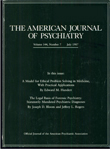Premenstrual Syndrome: Evidence for Symptom Stability Across Cycles
Abstract
OBJECTIVE: This study assessed cycle to cycle symptom stability in women with premenstrual syndrome (PMS). METHOD: Symptom ratings obtained prospectively over three or more symptomatic cycles from 16 women with PMS were analyzed. Measures of symptom severity and change were used to generate a coefficient of variation and an intraclass correlation coefficient (ICC) for each one of 14 symptoms across all cycles. In addition, symptoms were divided into three clusters, and the stability of the rank order of severity of symptoms within clusters and the correlation between symptom clusters were also calculated. RESULTS: In the 65 cycles studied, mood symptoms were the most prevalent. Mood symptoms—anxiety, irritability, and mood lability—had the lowest coefficients of variation but also the lowest ICCs of all symptoms. Within their respective symptom clusters, both physical and mood symptoms showed remarkable stability across cycles of their rank order of severity, but only the mood symptom cluster was highly correlated with functional impairment. CONCLUSIONS: Three mood symptoms—anxiety, irritability, and mood lability—were the most stable symptoms in this group of women with PMS. Mood and not somatic symptoms accounted for most of the functional impairment in this group of women. It is concluded that PMS is a stable syndrome that may best be viewed as part of the spectrum of recurrent mood disorders. (Am J Psychiatry 1997; 154:1741–1746)



